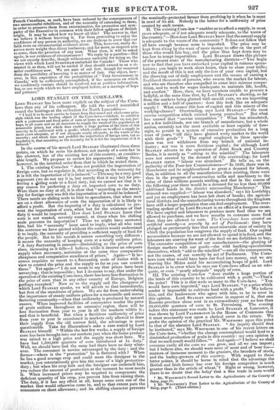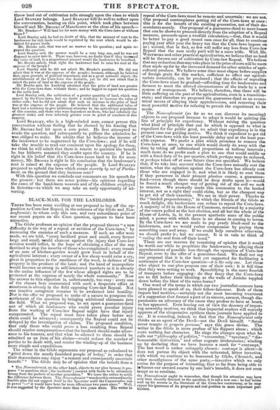LORD STANLEY ON THE CORN-LAWS.
Loan STANLEY has been more explicit on the subject of the Corn- laws than any of his colleagues. He told the crowd assembled round the hustings at the reelection for North Lancashire—. "1 hold it to be most unwise to depart from that sound and wholesome prin- ciple which was the leading object of the Corn-laws,—videlicit, to establish such a permanent and fixed price of corn at home as may enable us, not, per- haps, in all years and on all occasions to supply the wants of the population at reasonable prices, but which does enable a large portion of the lands of this country to be cultivated with a profit; which enables us to afford a supply in Most years adequate, or If not adequate nearly adequate, to the wants of the country; and which does not prohibit the importation of foreign corn, but so regulates it, that according as the necessity for it is felt the importation of it is induced."
In the course of his speech Lord STANLEY illustrated these three points, on which he rests his defence, not merely of a corn-law in the abstract, but of the existing law of this country, at consider- able length. We propose to review his arguments ; taking them, however, in the inverted order from that in which he stated them.
L The existing Corn-law "does not prohibit the importation of foreign corn, but so regulates it, that according as the necessity for it is felt the importation of it is induced."—This may be a very good argument (we do not say it is, but merely that it may be) for pre- ferring a sliding scale to a fixed duty, but we cannot see that it is any reason for preferring a duty on imported corn to no duty. Were there no duty at all, it is clear that "according as the neces- sity for foreign corn was felt the importation of it would be induced." There needs no sliding scale to hint to speculators, that when men are on a short allowance of corn the importation of it is likely to afford a profit. But the -imposing of a duty is calculated to pre- vent the importation of corn, when but for the existence of that duty it would be imported. How does Lord STANLEY know that corn is not wanted, severely wanted, at times when his shifting scale prevents its importation ? Thus we might have answered him, had his " necessity " been used to imply, what all who read the sentence we have quoted without the context would understand it to imply, the necessity of providing a sufficient supply of food for the people. But in his mouth it means something very different ; it means the necessity of keeping corn at a nearly uniform price. "A duty fluctuating in amount—diminishing as the price of corn rises, increasing as it falls—I believe, while it insures an adequate supply when necessary, maintains at the same time comparative cheapness and comparative steadiness of prices." Again—" It be- comes requisite to resort to a fluctuating scale of duties with a view to control the price and the supply as far as you can control them." Yet again—" I do not mean to say that prices have been unvarying; that is impossible • but I do mean to say, that under the operation of the existing Corn-laws, there has been less fluctuation in the price of corn than in any other country of Europe, Belgium perhaps excepted." Now as to the supply and the cheapness of which Lord STANLEY speaks, we will advert to that immediately, but first of the steadiness of prices. We are far from undervaluing the importance of steady uniform prices for a mercantile and manu- facturing community—when that uniformity is produced by natural causes. When improved facilities of conveyance render the price of grain uniform throughout an extensive region, there will be less fluctuation from year to year in all the markets within it ; and that is beneficial. But when a factitious uniformity of price from year to year is occasioned in markets only allowed to draw their supply from the old narrow field, the advantage is more questionable. Take for illustration's sake a case stated by Lord STANLEY himself: "Within the last few weeks, a supply of foreign corn has been brought into our markets just when the home produce was raised to a high price and the supply was short here. We have had 1,500,000 quarters of corn introduced at Is. duty." Well, we should have had the same had there been no duty what- ever. The consumer is nowise advantaged by the duty : and the farmer—where is the "protection" he is flattered with ? When he has a good average crop and could meet the- foreigner in the market, you ostentatiously give him the name of a high protective- duty ; but when his crop fails and the foreigner can undersell him, 7ou reduce the amount of protection at the moment he most needs it. When increased prices may be required to compensate the deficient quantity of his crop, you prevent him from raising them. The duty, if it has any effect at all, keeps some corn out of the market that would otherwise come in, and to that extent puts the Consumers on short allowance ; and its shifting character prevents the nominally-protected farmer from profiting by it when he is most in need of its aid. Nobody is the better for a uniformity of price created by such means.
III. The existing Corn-law "does enable a large portion of the lands of this country to be cultivated with a profit. '—That's the point ! This it is that weds so many to the Corn-laws. "You would have corn imported," says Lord STANLEY, "at a price which render it impossible to cultivate land with a profit." We believe him, and the landowners who agree with him, to be in error in this opinion. Lord STANLEY mentions in support of it, that one Russian province alone sent in an extraordinary year no less than 38,000,000 quarters of corn to St. Petersburg. The evening before this statement was made by Lord STANLEY at Lancaster, it was shown by Lord PALMERSTON in the House of Commons that it must necessarily rest upon a clerical error in the return. We prefer the opinion of the practical Mr. WHITMORE upon this point to that of the alarmist Lord STANLEY. "An inquiry should first be instituted," says Mr. Wurrrsoas in one of his recent letters on the Corn-laws, "whether the change contemplated would lead to a diminished production of grain in this country : my own opinion is that no such result would follow." And again—" I believe we shall consume easily all the corn we can grow, and all we can import ; but I believe also, we should want more of meat and of beer too— matters of immense moment to the graziers, the breeders of stock, and the barley-growers of this country. With regard to these latter points, it should be borne in mind that the advantage the British and Irish farmer has over his foreign competitor is much greater than in the article of wheat."t Right or wrong, however, there is no doubt that the belief that a free trade in corn would • Mr. WHITMORE'S Second Letter to the Agriculturists of the County of Salop, page 81. Mr. WHITMORE'S First Letter to the Agriculturists of the County of Salop, page 9. (Third edition.) throw land out of cultivation tells strongly upon the class to which Lord STANLEY belongs. Lord STANLEY will do well to reflect upon the conversation, bearing on this point, which took place between himself and Mr. BROOKS of Manchester at the close of his speech—
Mr. Brooks—" Will land let for more money with the Corn-laws or without them?" Lord Stanley said, he had no doubt of this, that the amount of rent to the landowner for rich lands would be regulated by the rent which would be ob- tained for poorer lands.
Mr. Brooks said, that was not an answer to his question; and again re- peated the question.
Lord Stanley said, the answer would be a very long one, and he was not disposed to enter into it. There was, however, no doubt that if they increased the value of land, in a proportional amount would the landowner be benefited.
Mr. Brooks ,asked, what right the landowner had to raise his rent at the expense of thepeople ?
Lord Stanley said he did not admit Mr. Brooks's position. He did not admit that it was at the expense of the people ; because, although he believed that, upon grounds of political importance and as a great national object, the establishment of the Corn-laws was desirable, yet he did not admit that it raised the price of land at the expense of the people. Mr. Brooks said, his Lordship admitted that the price of land was greater with the Corn-laws than without them ; and he begged to repeat his question to the noble lord.
Lord Stanley said, the cultivation of a greater quantity of land, which was caused by the Corn-laws, had no doubt a tendency to increase the value of richer soils; but he did not admit that such an increase in the price of land was at the expense of the people. He believed that the additional value of land had a tendency to give additional stimulus to the agricultural population of this country, and those who were dependent on them, who had infinitely the greatest stake, and were infinitely greater even in point of numbers in this country.
Lord STANLEY, who is a high-minded man, cannot peruse this conversation without feeling that he showed by his fencing that Mr. Baooes had hit upon a sore point. He first attempted to evade the question, and subsequently to palliate the admission he was obliged to make. He admits that he believes the income of the landowner to be augmented by the Corn-laws ; and if he will take the trouble to read our comment upon his apology for them, we think he will admit that there is reason to question the benefit he has hitherto assumed they confer upon the country. If he is right in his belief that the Corn-laws cause land to let for more money, Mr. Baooss is right in his conclusion that the landowner's rent is raised at the expense of the people. Is Lord STANLEY prepared to uphold the laws which create scarcity by act of Parlia- ment, on the ground that they increase rent?
With this question we conclude our comments on his speech for the present : but there are some points—his opinions regarding the cases of the hand-loom weavers and of the children employed in factories—to which we may take an early opportunity of ad- verting.



























 Previous page
Previous page